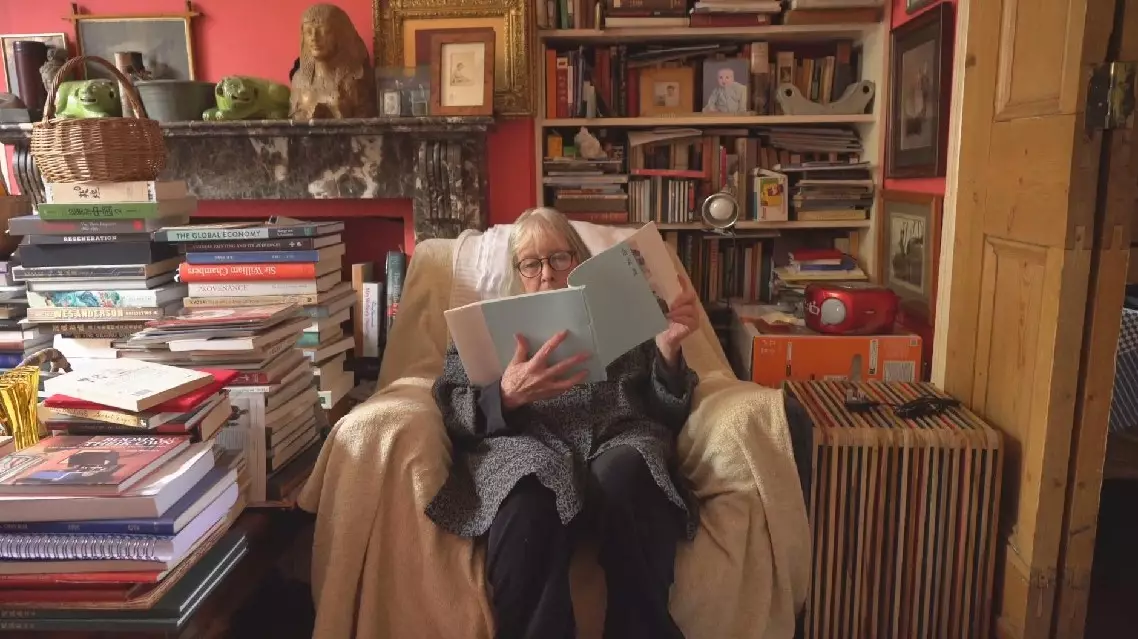風蕭蕭_Frank
以文會友英國漢學家:中國文化不需要證明自己
2024-07-17
英國著名漢學家表示,中國文化不需要證明自己,她強調,中國獨特的文字和建築不僅是中國文化的象征,也代表了中國在全球舞台上的獨特聲音。
英國圖書館中國藏品前館長弗朗西絲·伍德在接受采訪時分享了她對中國文化傳播的看法,這是中國環球電視網(CGTN)製作的紀念中華人民共和國成立75周年特別係列節目《奔向未來》的一部分
她說,她花了50年甚至更長的時間向人們講述中國,因為他們對這個國家的一切都很感興趣。
“我認為中國不需要付出任何努力來讓自己的文化更具吸引力。中國文化本身就極具吸引力。中國過去、現在和現在都一樣。”她說。
伍德於20世紀70年代在劍橋大學學習中文,之後在中國首都北京的北京大學學習期間曾多次遊曆中國。她從倫敦大學獲得中國建築碩士學位後,於1977年加入大英圖書館,擔任中國藏品館長30多年,直至 2013 年退休。
在采訪中,她回憶起 1971 年第一次去中國的經曆。
“中國完全不同。幾乎無法描述。我對當時的北京有著美好的回憶,當時它真的是一個有點沉睡的小城市,非常非常迷人,仍然保留著古老的網格係統。但現在,城市轉變為大片區域的速度令人難以置信。建設速度、變化速度絕對非同尋常。我不知道作為北京的居民,看到你的城市以每小時 100 英裏的速度從你身邊飛馳而過會是什麽感覺,”她說。
她說,中國文明的魅力在於差異,這確實是魅力的一部分。
“漢語是如此與眾不同,非常強大,非常獨特,非常中國化。世界上沒有其他人可以宣稱擁有漢語和文字,以及其非凡的美麗和複雜性。中國在現代世界中擁有非常獨特的聲音,”伍德說。
她對當代中國年輕人對傳統文化越來越感興趣表示讚賞。
“人們現在可能正在尋求建立一種更加和平和滿足的生活,並通過傳統思想尋找滿足的方式、幸福的方式。想要重新發現和享受過去的美好事物是非常自然的事情,”伍德說。
當被問及中華文明的核心精神是什麽時,這位學者說是“非凡的長壽”,她說中國的精髓在於其持久的曆史和連續性,包括古老的信仰、創新和文化遺產,這些仍然是其社會的基礎。
“我認為,中國文化的本質就在於其非凡的長壽,綿延數千年,中國曆史不斷向前發展。我認為這種連續性包括儒家信仰,也包括發明、美感和對各種美的欣賞,以及建築、瓷器和陶瓷生產、絲綢生產等等。我認為所有這些在中國都存在了很長時間。它們對當今中國社會來說非常非常重要,而且是絕對不可或缺的,”伍德說。
Chinese culture does not need to prove itself: British sinologist
2024-07-17
Chinese culture does not need to prove itself, said a renowned British sinologist, who emphasized that China's unique script and architecture are not only symbols of its culture but also represent its distinctive voice on the global stage.
Frances Wood, former curator of the British Library's Chinese collections, shared her views on the transmission of Chinese culture in an interview, part of a special series "Race to the future" commemorating the 75th anniversary of the founding of People’s Republic China, produced by the China Global Television Network (CGTN)
She said she spent 50 or more years talking about China to people because they are so interested in everything about the country.
"I don't think that China needs to make any effort to make its culture more appealing. It is enormously appealing. China was there, is there and remains the same," she said.
Wood studied Chinese at Cambridge University in the 1970s, before traveling extensively in China while studying at Peking University in the Chinese capital of Beijing. After graduating from London University with a master's degree in Chinese Architecture, she joined the British Library in 1977 and served as the curator of the Chinese collections for more than 30 years, until retiring in 2013.
In the interview, she recalled her first trip to China in 1971.
"China was so completely different. It's almost impossible to describe. I have such fond memories of Peking at the time when it was really a kind of little slightly sleepy city, very, very charming, still retaining its old grid system. But now it's unbelievable the speed with which cities have been transformed into massive areas. The speed of building, the speed of change is absolutely extraordinary. I don't know what it can be like really to be an inhabitant of Beijing to see your city go kind of rushing past you at 100 miles an hour," she said.
She said the charm of Chinese civilization lies in the difference, which is really part of the charm.
"The Chinese language is so extraordinarily different, very strong, very distinctive and very Chinese. Nobody else in the world can lay claim as it were to the Chinese language and script and its extraordinary beauty and complexity. China has got a very distinctive, it's got a very distinctive voice in the modern world in that way," Wood said.
She gave a thumb-up to the contemporary Chinese young people as they are increasingly interested in traditional culture.
"People are now perhaps sort of seeking to establish a kind of a more peaceful and contented life and searching for the ways of being content, ways of being happy through traditional ideas. It's a very natural thing to want to kind of rediscover and enjoy again, things that were good in the past," Wood said.
When asked what is the core spirit of Chinese civilization, the scholar said it is "extraordinary longevity," as she said the essence of China lies in its enduring history and continuity, encompassing ancient beliefs, innovations, and cultural heritage that remain fundamental to its society.
"I suppose so intrinsic to China is that extraordinary longevity, that uninterrupted millennia, that Chinese history just goes on backwards and then on forwards. And I think that continuity, which includes things like Confucian beliefs, but also inventions, a sense of beauty and appreciation of different sorts of beauty and architecture and porcelain and ceramic production, silk production and so on. I think all those things are so long lived in China. They are very, very important and absolutely intrinsic to Chinese society today," Wood said.

Chinese culture does not need to prove itself: British sinologist




